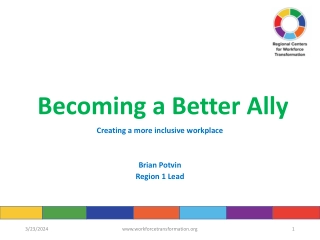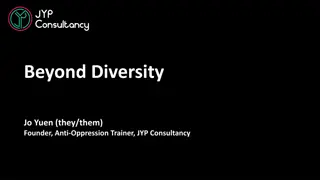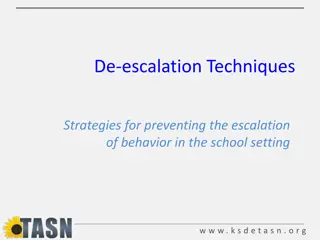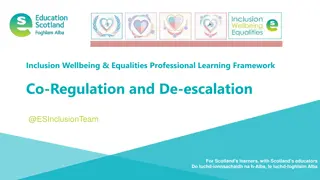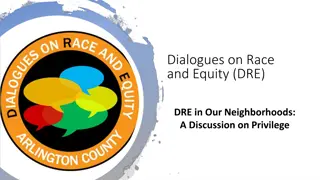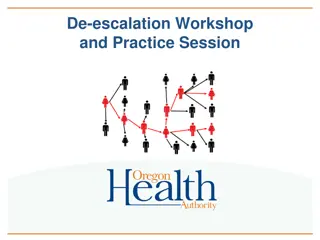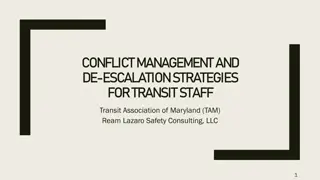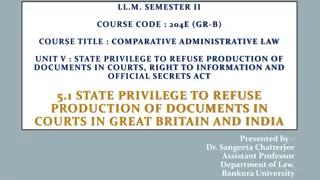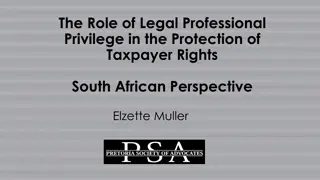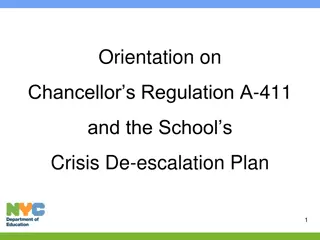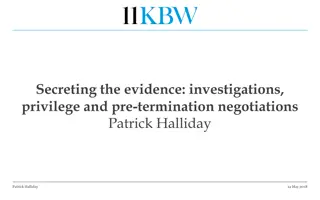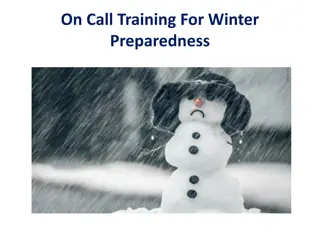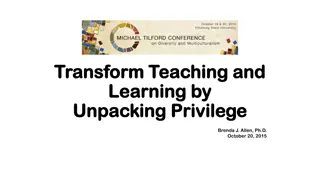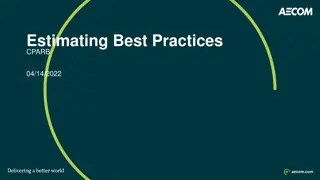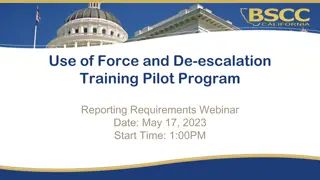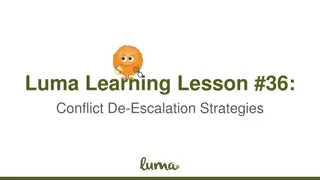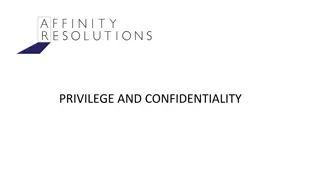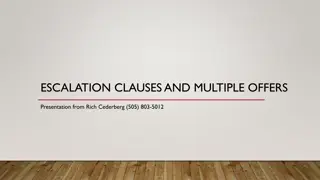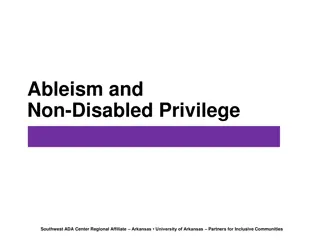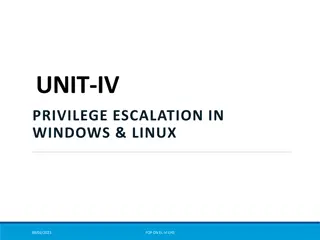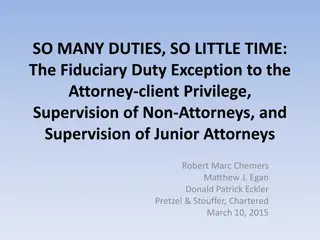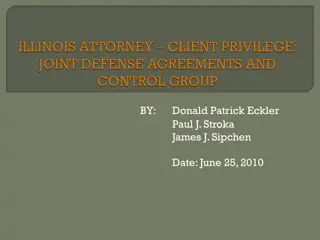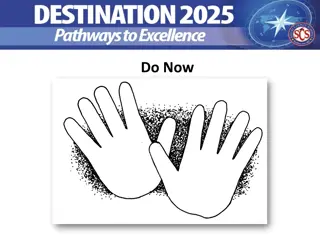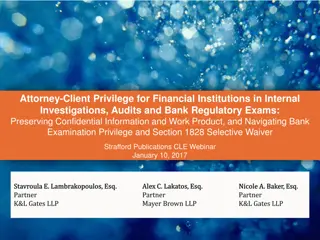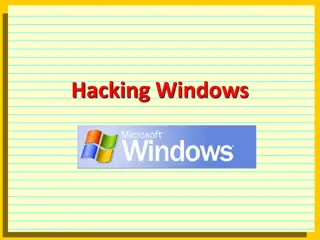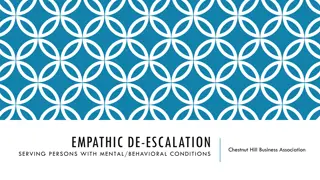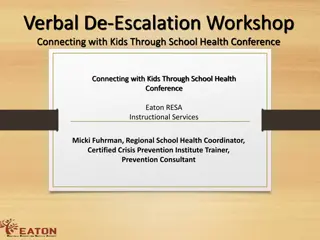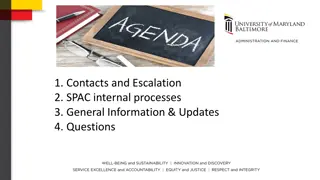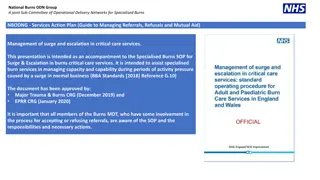Becoming a Better Ally
Understanding privilege is essential to becoming a better ally in creating a more inclusive workplace. Privilege encompasses unearned benefits based on social groups like race, gender, and class. Instead of feeling guilty, individuals in positions of privilege should empathetically leverage their ad
0 views • 28 slides
Understanding Privilege and Oppression in Diversity Training Session
Explore privilege, intersectionality, and structural inequity in a training session led by Jo Yuen. Participants will learn key terms, allyship strategies, and engage in discussions to foster a safe and open environment. The session includes a working agreement, introductions, breakout discussions,
0 views • 22 slides
Effective De-escalation Techniques for School Settings
Explore strategies and techniques for preventing behavior escalation in schools based on the work of experts like Dr. Geoff Colvin and Dr. George Sugai. Understand the importance of managing disruptive behaviors, proactive interventions, and stages of escalating behavior. Discover how to become flue
1 views • 52 slides
Scotland's Professional Learning Framework: Co-Regulation and De-escalation
This professional learning framework focuses on co-regulation and de-escalation strategies for Scotland's educators to enhance the well-being and inclusion of Scotland's learners. It includes resources for facilitating group or self-directed learning activities, emphasizing the importance of creatin
1 views • 39 slides
Clinical Escalation: Building Effective Communication in Maternity Units
Exploring the importance of clinical escalation in maternity units, this session outlines the components and practices involved in identifying, communicating, and acting upon clinical concerns. It emphasizes recognizing deviation from normality, effective communication, and taking appropriate action
0 views • 27 slides
Exploring Privilege and Racism in Our Communities
Delve into the concepts of privilege, white privilege, and systemic racism through dialogues and guidelines. Understand how unearned benefits affect social groups and ways to address these issues within our neighborhoods. Explore actions within your sphere of influence to promote equity and justice.
0 views • 6 slides
De-escalation Workshop and Practice Session Overview
This overview provides insights into a De-escalation Workshop and Practice Session, emphasizing the importance of video and microphone usage, the commitment of the CRRU Training Team, workshop topics, and strategies for building rapid rapport. It also discusses common concerns and pushback faced in
0 views • 25 slides
Conflict Management and De-escalation Strategies for Transit Staff
This presentation by the Transit Association of Maryland (TAM) and Ream Lazaro Safety Consulting provides insights into the increasing assault injuries in transit since 2008, definitions of assault, assault types, contributing factors, basic needs of transit passengers, and passenger traits that may
0 views • 57 slides
State Privilege to Refuse Production of Documents in Courts: A Comparative Analysis between Great Britain and India
Doctrine of state privilege allows governments certain privileges, such as the right to refuse production of documents in courts. This privilege is recognized in both Great Britain and India, with specific statutory provisions defining its scope and application. In Great Britain, the Crown's powers
2 views • 12 slides
Legal Professional Privilege in the Protection of Taxpayer Rights: South African Perspective
Legal professional privilege plays a crucial role in safeguarding taxpayer rights in South Africa. This privilege ensures that communications between a legal advisor and client remain confidential, promoting fairness in litigation and enabling a proper functioning adversarial system of justice. The
0 views • 16 slides
School Crisis De-escalation Strategies and Plans
Schools in New York City are committed to maintaining safe and orderly environments for effective teaching and learning. Establishing Crisis Intervention Teams and completing Crisis De-escalation Plans are essential. De-escalation strategies involve identifying crises, assessing strengths and weakne
0 views • 31 slides
Understanding Conflict Dynamics and Peace Processes
Explore the distinctions between peacekeeping, peacemaking, and peacebuilding in conflicts. Learn about conflict dynamics and the stages of escalation and de-escalation. Discover how these models guide responses and peace efforts, emphasizing the importance of long-term peacebuilding for sustained r
0 views • 8 slides
Understanding Legal Privilege in Investigations and Pre-termination Negotiations
This content delves into recent developments in the law of privilege, highlighting the types of privilege such as legal professional privilege, litigation privilege, and without prejudice privilege. It explains working definitions of legal advice privilege and litigation privilege, emphasizing commu
0 views • 13 slides
Winter Preparedness Training for Strategic Leadership in Escalation Situations
The Winter Preparedness Training focuses on preparing executive leads and on-call managers to provide strategic leadership during extreme periods of escalation. The training covers roles and responsibilities, strengths and weaknesses, escalation processes, teleconference chairing skills, partner col
0 views • 20 slides
Understanding Privilege Escalation and Backdoor Installation in Cybersecurity
Privilege escalation allows unauthorized access to system resources, while backdoors enable persistent access for attackers. The attack scenario involves compromising a website to deploy malicious files, such as Remote Access Trojans, leading to potential system compromise.
0 views • 13 slides
Irish Paediatric Early Warning System (PEWS) Update and Implementation Overview
Explore the latest updates on the Irish Paediatric Early Warning System (PEWS) including learning outcomes, aims, observation charts, key points, escalation guide, and response pathways. Understand the importance of clinical judgment, individualized assessment, and standardized communication for rec
0 views • 15 slides
Intercept X - Early Access Program Overview
Intercept X's Early Access Program offers advanced security solutions to combat active adversaries and advanced malware. The program covers deep learning techniques, false positive mitigations, and credential theft protection. It focuses on protecting against various threats such as credential theft
0 views • 14 slides
Understanding Privilege and Its Implications in Society
Exploring various forms of privilege such as class, ability, religion, sexuality, and race, this content delves into the advantages individuals may have based on their social identities. It discusses how privilege influences one's access to resources, treatment in society, and overall experiences in
1 views • 14 slides
Project Management Fees and Escalation Challenges Analysis
In the analysis of project management fees and escalation challenges, key findings include low fee percentages, inconsistent reporting practices, and high escalation rates. Proposals suggest revising fee structures, monitoring design/management fees, and addressing code and practice escalation. Reco
2 views • 12 slides
Data Governance Issue Assessment Process Overview
The data governance issue assessment process formalizes how data issues are resolved by identifying clear steps to resolution, assigning responsibilities, and ensuring proper documentation. Lead stewards, liaisons, committee members, and support personnel play key roles in this process, which includ
1 views • 12 slides
Use of Force and De-escalation Training Pilot Program Reporting
The Use of Force and De-escalation Training Pilot Program aims to enhance law enforcement training methods. Established under the 2022 Budget Act, it requires reporting on participant demographics, training details, incidents, expenditure, and satisfaction metrics. Reports include baseline, annual d
4 views • 15 slides
Effective Ways to Handle Escalation with Your Child
Explore top 10 do's and don'ts when dealing with escalation with your child, emphasizing on maintaining composure, positive communication, and effective de-escalation techniques to handle challenging situations constructively. Learn about common escalation patterns and practical strategies to diffus
0 views • 4 slides
Conflict De-Escalation: Strategies for Handling Workplace Conflicts
Learn effective conflict de-escalation strategies for handling workplace conflicts. Strategies include removal/walk away, calming yourself, checking voice and body language, being aware of surroundings, expressing empathy and understanding, and reflecting and regrouping for future resolution.
0 views • 7 slides
Effective De-escalation and Distraction Techniques for Children
De-escalation techniques focus on helping children manage overwhelming emotions. Strategies include acknowledging feelings, using distraction, and giving space. Avoid demanding, stay calm, respect personal space, and offer distractions. Knowing what your child likes and dislikes is key to effective
0 views • 6 slides
Understanding Legal Privilege and Confidentiality in the Legal System
Legal privilege and confidentiality play crucial roles in protecting communications between clients and lawyers, especially in the context of legal advice and ongoing litigation. This article explores the nuances of privilege, types of communications covered, scenarios where privilege can be waived,
1 views • 15 slides
Understanding Escalation Clauses in Real Estate
An escalation clause, also known as an escalator, allows a home buyer to increase their offer if a competing offer is higher. This presentation explains the components of an escalation clause, how it works in multiple offer situations, and provides sample language for incorporating it into a real es
0 views • 8 slides
Understanding Queer Perspectives on Privilege, Whiteness, and Class
Explore the nuanced concepts of privilege, whiteness, and class through a queer lens as discussed in Bruce Henderson's book "Queer Studies: Beyond Binaries." Delve into the invisible benefits of privilege, the implications of whiteness as a societal construct, and the intersectionality of social and
0 views • 22 slides
Understanding Ableism and Non-Disabled Privilege
Ableism and Non-Disabled Privilege are explored in depth, highlighting definitions and concepts related to power, privilege, oppression at individual, institutional, and cultural levels. The content delves into attitudes, beliefs, socialization, and behaviors that perpetuate discrimination, as well
0 views • 12 slides
Understanding Privilege Escalation in Windows and Linux Systems
Privilege escalation attacks are malicious tactics used by attackers to gain unauthorized access and elevated privileges in a system. These attacks exploit vulnerabilities in operating systems and web applications, allowing attackers to move deeper into a network to access high-value assets. This co
0 views • 28 slides
Understanding the Fiduciary Duty Exception to Attorney-Client Privilege
Several courts have deliberated on extending attorney-client privilege to protect communications between law firms' in-house counsel seeking advice on handling potential malpractice claims. This exception, known as the fiduciary duty exception, has faced scrutiny and rejection in recent cases, safeg
0 views • 36 slides
Handling Privilege and Discovery Issues in Corporate Litigation
Exploring privilege assertions and discovery rules in Illinois law for corporate litigation cases, emphasizing the burden of proof on privilege assertion, strong disfavor of privileges, and exceptions in certain circumstances. Understanding the importance of disclosure in legal proceedings and the n
0 views • 51 slides
De-Escalation Strategies in Classroom Management
Learn effective de-escalation strategies to manage classroom behaviors using Love and Logic principles. Explore techniques to prevent explosive behaviors, understand verbal and non-verbal de-escalation methods, and create a proactive plan to address challenging situations. Discover the importance of
0 views • 34 slides
Understanding Web Security: Risks, Threats, and Safeguards
In the realm of web security, it is crucial to shift our mindset to anticipate malicious intent and potential vulnerabilities. Attackers can aim to access private data, manipulate information, disrupt services, or tarnish reputations. Familiarize yourself with common attacker goals, tools used, and
0 views • 18 slides
Understanding Attorney-Client Privilege for Financial Institutions
Explore the intricacies of attorney-client privilege, bank examination privilege, and work product doctrine in the context of internal investigations and audits within financial institutions. Learn how these protections safeguard confidential information, promote open communication, and guide intera
0 views • 46 slides
Windows Security Overview and Best Practices
Windows operating system security overview focusing on preventing unauthorized access, privilege escalation, and password vulnerabilities. Includes countermeasures such as setting proper permissions, implementing strong passwords, and detecting vulnerabilities. Covering topics like remote password g
0 views • 6 slides
Empathic De-escalation for Handling Mental Health Issues in the Workplace
Reduce stigma around mental and behavioral health in the workplace through education. Understand behaviors as forms of communication and learn de-escalation techniques. Manage responses, establish rapport, and use non-judgmental approaches to address escalating situations effectively.
0 views • 9 slides
Verbal De-Escalation Techniques for Connecting with Kids at School Health Conference
This content highlights the importance of verbal de-escalation in connecting with kids through a school health conference, providing insights on crisis development models, handling anxiety, empathic listening, and dealing with defensive behavior. The workshop emphasizes building rapport and understa
0 views • 48 slides
SPAC Internal Processes and Contact Information
This information covers SPAC internal processes related to collections, reporting, response time for issues, and escalation procedures. It also provides contact details for various SPAC teams, emphasizing email communication for faster resolutions. Additionally, it outlines the quarterly collections
0 views • 22 slides
Understanding Attorney-Client Privilege
Privilege in law refers to the right to block certain evidence from being admitted in a case, even if it is relevant. Attorney-client privilege, like the one defined in Texas Rule 503, allows individuals consulting a lawyer for legal advice to keep their discussions confidential. Exceptions to this
0 views • 54 slides
National Burns ODN Group A Joint Sub-Committee Action Plan
This presentation accompanies the Specialised Burns SOP for managing surge and escalation in critical care services. It provides guidance on handling referrals, refusals, and mutual aid to manage capacity during periods of increased activity pressure. The document, approved by Major Trauma & Burns C
0 views • 22 slides
